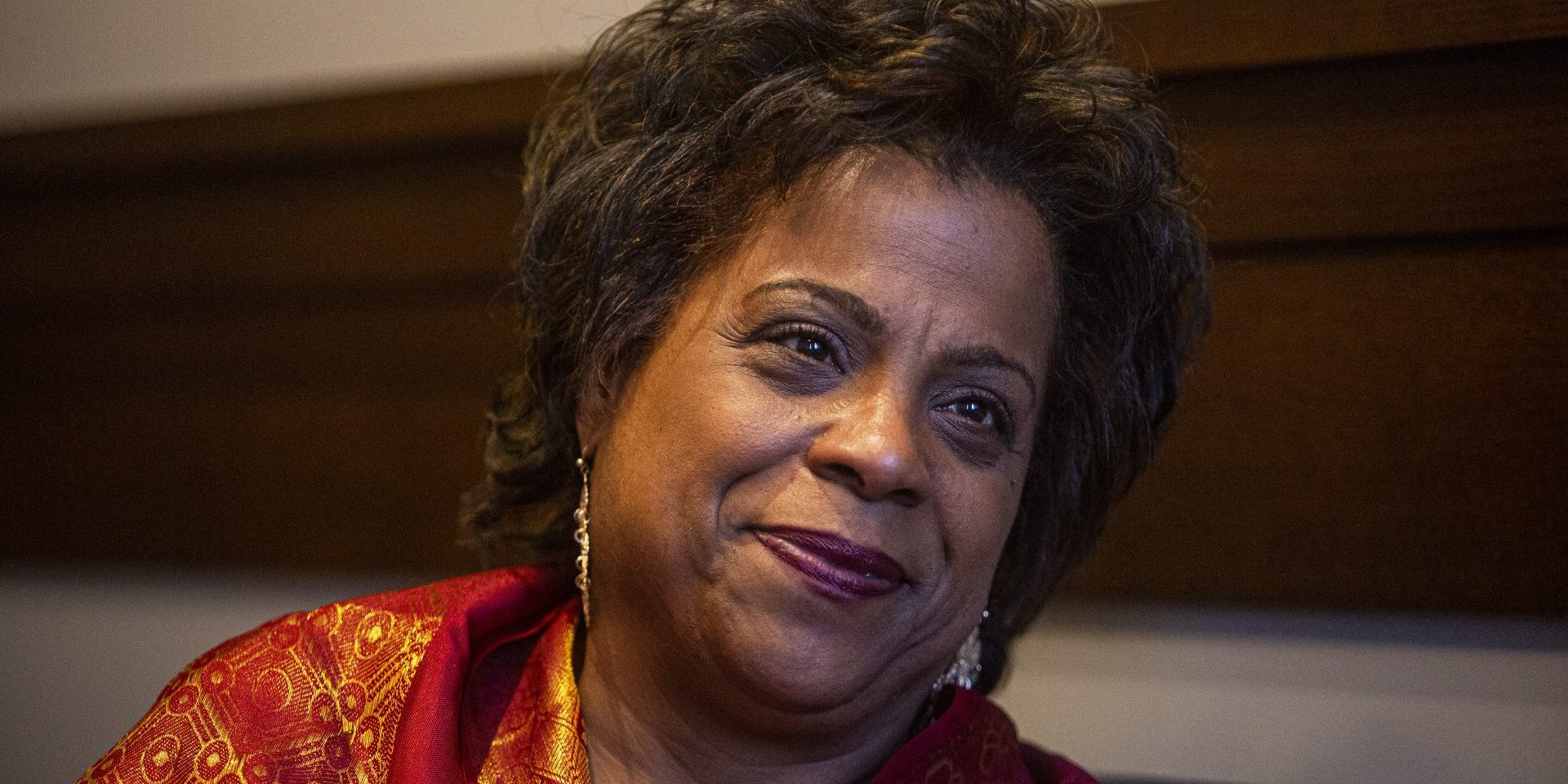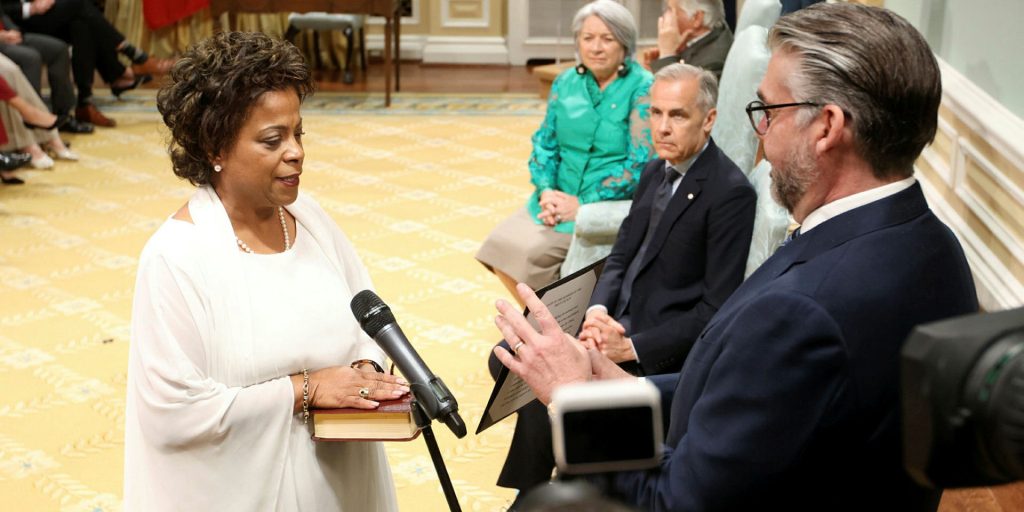Health minister says mental health and access to care are on her list of priorities

Canada’s new federal Health Minister Marjorie Michel says some of her top files will be focusing on mental health and access to health care, but declined to get into any specifics while she’s still talking to the provinces and territories. However, there are two specific tasks she is going to have to deal with: renegotiating bilateral agreements from 2023 that were meant to help connect more Canadians to primary care providers, and getting more provinces on board with the previous government’s national pharmacare plan.
“We are hearing a lot that people don’t have family doctors, [and] they [do not] have access [to care], etc. So, access is very important for me. And second, mental health also is very, very important for me,” said Michel (Papineau, Que.), during an interview with The Hill Times on May 29 in West Block.
“I know those two things would be in my priorities, but how we are going to design them I cannot tell you because I’m talking with my [provincial and territorial] counterparts,” said Michel, a long-time Liberal insider who was most recently deputy chief of staff to then-prime minister Justin Trudeau before she ran to replace him as MP in the Montreal riding of Papineau.
“I have to work with provinces and territories,” continued Michel, noting they are responsible for delivering most health care in Canada. “I can show some leadership; I can pull them together; I have some tools; but I am not the one doing it. This is why we need them, and they need us. So, it’s a relationship.”
The federal government is considered a funder of Canada’s public medicare system as services for the majority of the population are provided by provinces and territories. In the 2025-26 fiscal year, Ottawa is providing approximately $54.7 billion through the Canada Health Transfer.
Michel is now working on a list of priorities after receiving the single mandate letter provided by Prime Minister Mark Carney (Nepean, Ont.) to his 28-member cabinet. This breaks away from Trudeau’s practice of issuing different letters to each minister. Carney’s letter cites seven priorities that focus on strengthening Canada’s economy and sovereignty, building a new relationship with the United States, cutting the government’s operating spending, and making life—including housing—more affordable.

There is not a single mention of health policy in the 784-word letter, but that’s not a problem for the rookie health minister and MP.
“That was a gift for me,” Michel said about the single letter, adding that Carney’s priorities are a framework for the cabinet.
“He told us, ‘Go to your department, work with your teams, and get your priorities in [while] considering the framework,’” she said.
“So, for example, when you are talking about protecting Canadians, protecting Canadians is also health [and] that’s my responsibility so I can put a lot of things under this big framework.”
Appointed to the ministry on May 13, Michel said she reached out to her provincial and territorial counterparts “on the first day” to understand their health priorities. At the time of her interview with The Hill Times, she said she had spoken to most of those counterparts.
Of those she spoke with, Michel said that the biggest desire for most was related to the issue of foreign credential recognition for health-care professionals, and the need to have more doctors and nurses from other countries working in Canada.
Another concern is mental health and substance use.
“A number of them also want to know how we can better improve … mental health and the opioid crisis, and look into best practices, because all of them know that is very complex. Some provinces tried some models [and] others are trying others,” Michel said. “So, we will share practices.”
More than 50,000 people in Canada died from opioid toxicity between January 2016 and September 2024, according to data from the Public Health Agency of Canada released on March 7. Between January 2024 and September 2024, the deaths of 5,626 individuals were attributed to opioid toxicity, which is a decline of 12 per cent from 2023. (The federal health agency has not yet released data for the full 2024 year.)
Canadians also worried about access to care: Pollara poll
The need to improve access to care has been a headlining issue for federal, provincial and territorial governments since the COVID-19 pandemic highlighted the country’s shortage of health care workers.
A report from Health Canada this past January found that Canada’s 13 health-care systems require a significant boost in the number of medical professionals. The largest gaps are attached to family physicians, with the report saying there is a need for an additional 23,000—which would be an increase of 49 per cent from the current supply—and 28,000 more registered nurses, which would be a jump of 10 per cent.
Those health-care professionals are needed in part to connect millions of Canadians to a care provider. The OurCare study published last year from the MAP Centre for Urban Health Solutions at Toronto’s St. Michael’s Hospital found that 6.5 million adults in Canada don’t have either a regular doctor or nurse practitioner.

The demand for health-care professionals has been so high that the Trudeau government required that provinces and territories work on improving access to primary care in order to receive the $25-billion in bilateral funding under the “Working Together to Improve Health Care for Canadians Plan.” The 10-year plan was initially announced in February 2023.
Making it easier to access doctors and nurses is also very important to Canadians as proven by a poll conducted by Pollara Strategic Insights.
Dan Arnold, Pollara’s chief strategy officer, said that Canadians have positive feelings about the quality of care and the health care system if they have access to a doctor.
“But there’s a lot of negativity around access right now in terms of finding a family doctor and wait times for appointments with specialists and wait times for surgeries and ER wait times,” he told The Hill Times by phone on May 23.
“Those are the things that Canadians are most focused on right now in terms of the areas where they see the biggest needs for reform in the system,” he added.
The 2,001 adult Canadians that were sampled for the poll were asked how satisfied they were about access to different parts of the health-care system: prescription medication, family doctors, emergency room care, specialists, and mental health supports.
Between 51 per cent and 57 per cent said they were somewhat unsatisfied or very unsatisfied with access to family doctors, emergency care, and specialists. Forty per cent of respondents said the same about mental health supports. Fewer than one-fifth of Canadians (17 per cent) said they were very unsatisfied or somewhat unsatisfied about access to prescription medication.
“Something like pharmacare is relatively low down the list in terms of people’s priorities right now because they’re looking more at the immediate pressure points,” said Arnold about the poll which has not yet been released publicly. (Pollara provided the above data in advance of the poll’s publication.)
According to Jill Pilgrim, a former Liberal staffer to then-health minister Mark Holland, Michel will have to work on both.
Pilgrim, now a senior consultant at Santis Health, told The Hill Times by email that the current Working Together agreements—which strongly emphasize the need to bolster health human resources across the country—are only valid until the end of this fiscal year.

“Renegotiations will have to be undertaken for the next tranche of funding under that Plan,” wrote Pilgrim on May 28.
The Working Together deals put forward an initial round of funding for the years between 2023-24 and 2025-26. The remainder of the funding—which is meant to begin in 2026-27 and end in 2032-33—becomes available following the renewal of the agreements.
Pilgrim added that the “outstanding pharmacare agreements will certainly be top of mind” for Michel and her team.
The previous government’s pharmacare plan—an outcome of the Liberal Party’s supply-and-confidence agreement with the NDP—was based on the premise that the feds would negotiate bilateral agreements with provinces and territories to help them add specific diabetes medications and contraception to their public plans.
Three pacts with Manitoba, British Columbia, Prince Edward Island were signed when Holland was health minister.
But the fate of the national pharmacare plan was unclear when Carney, with his emphasis on fiscal restraint, took over the Liberal government from Trudeau. However, a fourth agreement was signed with the Yukon on March 20, which was one week after Carney was sworn in as prime minister.
Kamal Khera, who was the newly-appointed health minister at the time, told The Hill Times on March 22 that the Carney government would continue to work on delivering pharmacare “whether it’s diabetes medication that is changing lives [or] whether it is oral contraception that’s changing lives.” (Khera lost her seat during April 28 election.)
With only four jurisdictions having signed on, nine provinces and territories still do not have access to their share of the $1.5-billion that was promised in Budget 2024 for the first phase of a national pharmacare plan.
tsanci@hilltimes.com
The Hill Times






 LICENSING
LICENSING PODCAST
PODCAST ALERTS
ALERTS













